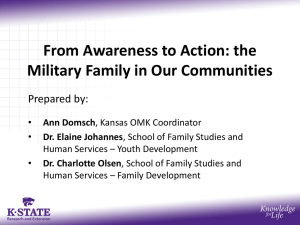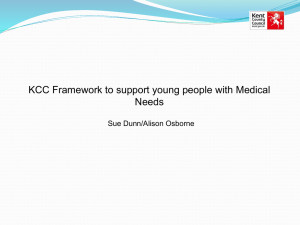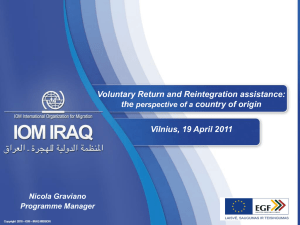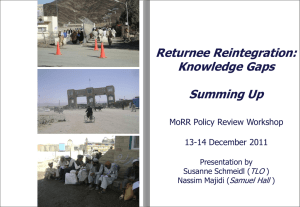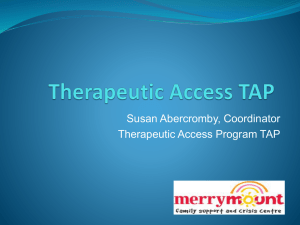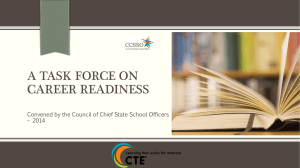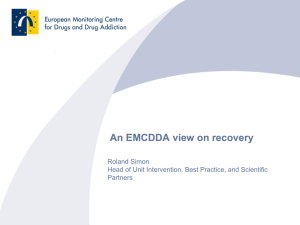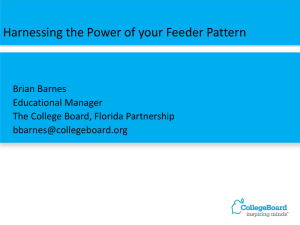Rewrite Mandatory Modules
advertisement
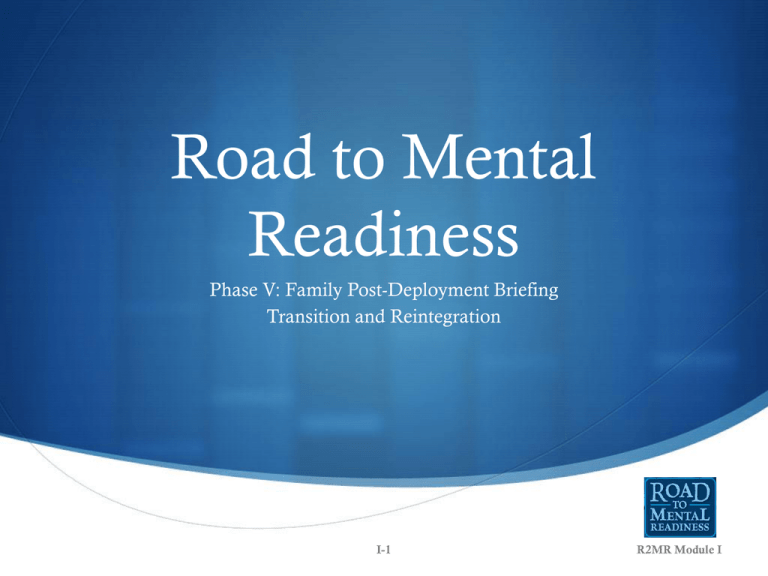
Road to Mental Readiness Phase V: Family Post-Deployment Briefing Transition and Reintegration I-1 R2MR Module I Course Objectives The goal of this course is to prepare you for the return of your loved one so you can: Understand the common challenges associated with transition and reintegration Improve your ability to manage these demanding conditions Enhance your long-term well-being I-2 R2MR Module I Your Experiences The challenges The accomplishments I-3 R2MR Module I The finish line THANK YOU BE PROUD YOU HAVE MADE IT I-4 R2MR Module I Transition and Reintegration I-5 R2MR Module I Transitioning from Operations Module II II-1 R2MR Module II Transitioning from operations Many families and CAF members experience conflicting emotions after a deployment. On one hand they are happy to be home and reunited, but on the other hand they feel edgy and angry … WHY? II-2 Adapted from Comprehensive Soldier Fitness Program R2MR Module II The stress response On a deployment stress hormones are released when: Confronted with highly stressful events The “gas pedal” revs the body up and keeps it on high alert Demands continue for a long period of time with no break The motor continuously idles II-3 R2MR Module II Stress is linked to emotions Stress causes: Increased feelings of irritability and anxiety Exaggerated emotional reactions to normal day to day activities II-4 R2MR Module II Stress increases arousal When you have been going that fast it takes extra time and measures for the body to slow down II-5 R2MR Module II Stress heightens threat sensitivity It takes time to readjust and turn off “high alert mode” II-6 R2MR Module II Stress reduces processing abilities It is common to think about or dream about adverse or challenging situations after stress has dissipated II-7 R2MR Module II Stress causes fatigue Following deployment you and your loved one may be physically, mentally and emotionally exhausted II-8 R2MR Module II The Challenges of Reintegration Module III III-1 R2MR Module III Mental Health Continuum Model HEALTHY REACTING Normal functioning Common and reversible distress INJURED III-2 Severe and persistent functional impairment ILL Clinical disorder Severe functional impairment R2MR Module III Reintegration Take Time What are some of the common challenges of reintegration for families? III-4 R2MR Module III Family Challenges How it “used to be” may no longer apply Unfinished business in relationships Who’s in charge? “Who had it worse?” Re-establishing intimacy Concerns about infidelity III-5 R2MR Module III Tools For Managing the Reintegration Module IV IV-1 R2MR Module IV Reuniting Communication is key to successful reintegration. IV-2 R2MR Module IV Tips for Communicating 1. Keep your message simple and clear 2. Stick to the current issue 3. Stay calm 4. Choose the best time and minimize distractions 5. Pay attention to non-verbal communication 6. Show empathy and caring 7. Acknowledge what you heard IV-3 R2MR Module IV Talking about Experiences Acknowledge, discuss and appreciate every family members’ contribution to the success of the operation. IV-4 R2MR Module IV Tips for Successful Reintegration Understand it is normal to feel out of sync Be patient with yourself and others Ease back into intimacy Plan down time and time to reconnect Tone down fantasies – reality may be quite different Don’t fix what’s working IV-5 R2MR Module IV Coping Strategies People can manage stress No single strategy works for every situation People usually rely on the same 3 or 4 coping strategies Sometimes we need new tools IV-6 R2MR Module IV Where can I find other tools? Free workshops through the CAF include: Inter-Comm Stress: Take Charge? Managing Angry Moments Mental fitness & suicide awareness IV-7 R2MR Module IV Problems Post-Deployment Module V V-1 R2MR Module V After an operation… Not to be distressed It’s OK Christiane Routhier, Ph.D. (2007) To be distressed V-2 R2MR Module V Personal Growth Not only are most people okay after an operation, many describe the experience as a major contributor to personal growth and development. V-3 R2MR Module V Signs of Reintegration Difficulties Relationships continue to be strained Ongoing avoidance/withdrawal Increased conflict Lack of intimacy Unequal distribution of household duties/parenting Financial problems Behavioural problems in children V-4 R2MR Module V Individual Warning Signs Irritability/impatience Nervousness Sadness/overwhelmed Displaced sarcasm Procrastination Forgetfulness Lasts for more than several weeks Gets worse over time instead of better Gets better but then gets worse Sleep difficulties Intrusive thoughts Muscle tension/aches and pains Fatigue/low energy Reduced social activities Regular but controlled alcohol or V-5 gambling R2MR Module V Red Flags V-6 Physical aggression Severe mood changes Suicidal thoughts/gestures High risk taking behaviour Excessive, uncontrolled spending Increased alcohol, substance use, gambling R2MR Module V Expressing Concern Close friends and family are often the first to notice when something is wrong and usually the first to express their concern V-7 R2MR Module V Accessing care V-8 R2MR Module V What can I expect if I seek help? 1. Education 2. Skills building (The Big 4) 3. Individualized application of knowledge and skills 4. Joint decision making regarding treatment V-9 R2MR Module V Resources for military members Friends/Family/Unit/Leadership Primary Prevention: Resources that enhance resilience and maintain health Road to Mental Readiness Health Promotion courses Supportive Intervention: Early, short term intervention Canadian Forces Members Assistance Plan 1-800-268-7708 Chaplains Psychosocial Services Medical Officers Family Resource Centres Clinical Intervention: For more serious mental health conditions requiring specialized care Mental Health Services Operational Trauma and Stress Centre Operational Stress Injury Social Support V-10 Road to Mental Readiness (R2MR) Resources for family members Friends/Family Military Family Resource Centre Family Information Line 1-800-866-4546 Primary Prevention: Resources that enhance resilience and maintain health Road to Mental Readiness Health Promotion courses Supportive Intervention: Early, short term intervention Canadian Forces Members Assistance Plan 1-800-268-7708 Chaplains Public Service Health Care Plan (PSHCP) Family Physician Psychosocial Services Clinical Intervention: For more serious mental health conditions requiring specialized care Family Physician Community Services and Hospitals Operational Stress Injury Social Support V-10 Road to Mental Readiness (R2MR) Family Resources Family and friends Employer & work colleagues Child/Elder care provider Military Family Resource Centre Minister/Spiritual Advisor Coach/Mentor/Teacher Chaplains Public Service Health Care Plan OSISS Family Support Coordinator The Centre (DCSM) Psycho-social Services Community MH Resources Family Physician Provincial Hospitals CF Member Assistance Plan 1-800-268-7708 Local Addiction agencies Family Info Line 1-800-866-4546 Self help groups V-11 R2MR Module V Preparing for a Successful Reintegration Module VI VI-1 R2MR Module VI My Action Plan VI-2 R2MR Module VI Thank You You have contributed to the success of this mission Your sacrifices and contributions are recognized and valued Enjoy the reunion! VI-3 R2MR Module VI Comments or Questions? Thank You VI-4 R2MR Module VI
